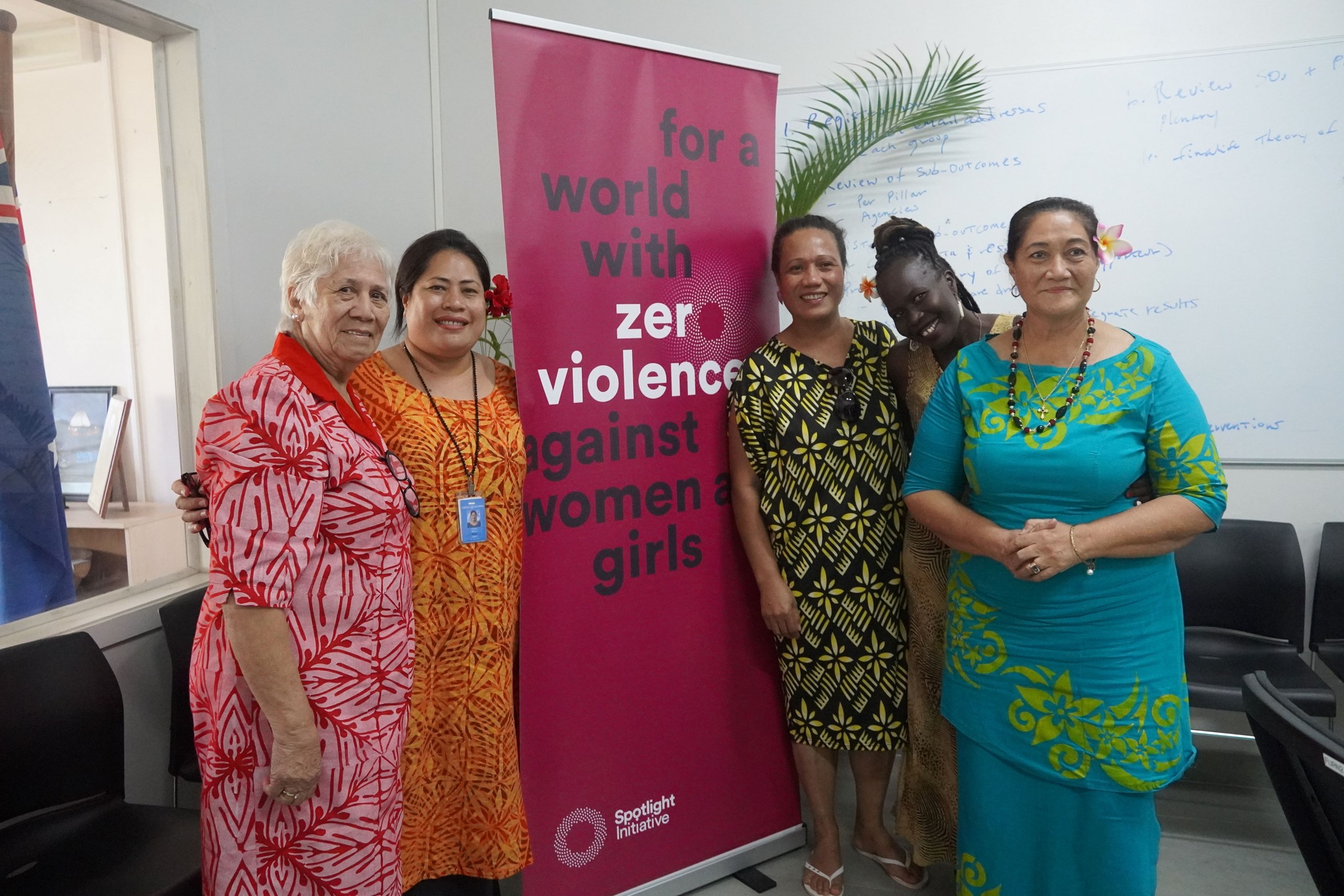End Violence against Women to achieve Gender Equality
August 16, 2023

The Spotlight Initiative works closely with civil society organisations to end violence against women & to empower women. Louisa Apelu (2nd fom left), is the UNDP Coordinator for the Spotlight Initiative
The women of this country deserve better.
That’s the premise upon which the Spotlight Initiative operated. It guided the work of this United Nations-European Union joint project over the last three years to the point where we can finally say that we have reached a point of breakthrough at long last in the fight against violence against women and girls in this country, particularly in breaking the silence surrounding this issue.
Latest findings from the Spotlight Initiative show that there is now a high level of reporting of domestic violence and violence against women and girls, to the relevant authorities. There is an advancement in what was traditionally perceived as the ‘culture of silence’ surrounding domestic violence and violence against women, which were largely seen as a private, shameful matter. More women are now confident to step out, speak up and seek help.
The 2019–2020 Samoa Demographic and Health Survey-Multiple Indicator Cluster (DHS MIC) revealed that 41% of women aged 15–49 years, who experienced physical or sexual violence, sought help, compared to 11% as shown in the 2017 Samoa Prevalence Family Safety Survey. More people are now aware of the dangers of being silent about this issue and are now reporting and doing something about it. While this is encouraging, we can still do more.
The Spotlight programme’s strength lies in its alignment to national priorities, leveraging partnerships across all pillars, working directly with more than 9,500 beneficiaries, and reaching approximately 132,000 people indirectly. Most of the beneficiaries are girls and women from ages 5–18 years and above.
During the COVID pandemic lockdowns, the Spotlight Initiative supported Civil Society, providing essential gender-based violence services, responding and reaching those at risk and in need of help, including the hardest to reach. Over 3,000 people, the majority of whom were women and children, were assisted with financial support from the Spotlight programme. The same support enabled women from the Samoa Victim Support Group’s Nofotane initiative to earn an income and take care of their families through the production and sale of face masks and handicrafts from the confines of their homes during lockdown.
The translation of the Leave No One Behind principle into concrete action, as well as national ownership of the Spotlight programme, facilitated increased and improved partnerships with Civil Society, government, village leaders, faith-based communities, and recipient United Nations organisations, who worked hard to ensure the inclusion of women and girls who were not well integrated into existing violence prevention efforts, meeting them in their contexts and communities.
The Spotlight Initiative also analyzed existing legislations to identify gaps and promote gender–sensitive laws and policies through the review of the Samoa Family Laws, which has been completed. The Law and Justice Sector Plan 2021–2025 integrates domestic and intimate partner violence into institutional functions of partners by committing government ministries under this sector to improve prevention measures and response to violence.
National, subnational and village mechanisms were established, positioning village leaders at the core of prevention and referral efforts. Five Village Family Safety Committee plans, and prevention action results, were developed and implemented in a participatory manner and included the rights of the most marginalized.
Over 700 village women were mobilized, trained, and reported as having greater agency and improved ability to work on ending violence against women and girls’ issues, across 16 villages.
This is heartening to see and should translate to a further commitment to do better in our homes, workplaces, churches, villages, organizations, and every other space.
We would never be able to fully achieve all the other Sustainable Development Goals if Goal 5 (Gender Equality) is not fulfilled. This can only be realized if the scourge of violence against women and girls is done away with completely. The women of this country deserve that, and so much more.
-ENDS-

 Locations
Locations